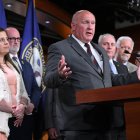Fiscal conservatives criticize Trump's megabill as not reforming Medicaid enough
While many Republicans remarked that reforms to the program are solely about "waste, fraud, and abuse," others were left with a taste of little.

Harris on Capitol Hill/ Al Drago
On the eve of Congress beginning to take up the Donald Trump-dubbed "One Big, Beautiful Bill," the various House Republican committees began releasing the components that will make up this bill, such as the tax reform. In this context, some House Republican hawks began to show their displeasure, particularly with the extent of reforms or non-reforms to Medicaid.
The complaints outlined so far have to do with the package that falls to the House Energy and Commerce Committee on Energy and Commerce, specifically with some items on Medicaid. His bill specifically includes a 160-page section covering health care.
"When so many Americans who are truly in need rely on Medicaid for life-saving services, Washington can’t afford to undermine the program further by subsidizing capable adults who choose not to work. That’s why our bill would implement sensible work requirements," Brett Guthrie (R-KY), chairman of the Energy and Commerce Committee, said of the bill.
However, while many Republicans remarked that reforms to the program are only about "waste, fraud, and abuse," others were left with a taste of nothing.
Republican Medicaid reform
Among other things, the bill would impose stricter Medicaid eligibility verification, citizenship checks, tougher screening of reimbursed providers, and cuts in federal Medicaid funding to states that offer coverage to residents living in the country illegally.
It also seeks to set work requirements for healthy adults between the ages of 19 and 64 without dependents, requiring them to work at least 80 hours a month or perform 80 hours of community service or other programs.
According to estimates by the Congressional Budget Office (CBO), the legislation would reduce the deficit by more than $880 billion by 2034.
At the same time, the bill did not include some provisions pushed by more fiscally conservative Republicans, such as per capita limits on Medicaid spending and increased state burden to cover the Medicaid expansion population under the Affordable Care Act.
Another complaint from this group is that the 80-hour-per-month requirement will go into effect at the beginning of 2029, considering it too late.
Cuts "not enough"
One of the first to raise his voice was Congressman Eric Burlison (R-MO), who was less than confident of the CBO's "weird math."
"At the end of the day, we have a $2 trillion deficit and the fact that we’re — we’re shuffling the chairs on the top of the Titanic here,” he added. “So we’ve got to do more," he told reporters on Capitol Hill.
For Andy Harris (R-MD), chairman of the House Freedom Caucus, one of his biggest disappointments with the bill is the delay in putting the work requirement into effect: "Literally, that’s like a parent telling their 25-year-old living in the basement, ‘You’ve got to get a job and move out, but you know what? I’m giving you four years to do it.’ It’s ridiculous. Nobody works that way."
In the same vein, stated Rep. Warren Davidson (R-OH). "Delaying a lot of these things is like hollow promises. They’ll cut that in four years, or they’ll phase it in over a longer period of time. And I’d rather see actually aggressive cuts."
">The proposal to stop waste, fraud, and abuse in Medicaid will do little to achieve that.
— Rep. Andy Harris, MD (@RepAndyHarrisMD) May 14, 2025
The common-sense work requirement for able-bodied adults doesn’t start for four years (into the next administration) and CAN BE WAIVED by any state for “hardship” that they determine (and…
"It's a money laundering scheme by the states"
Keith Self (R-TX) went a bit further in accusing states of profiting at Medicaid's expense.
"We’re still letting the states launder money through Medicaid by paying 90 percent of the cost for an able-bodied adult, when we pay for 57 percent of pregnant women, children, seniors, and disabled people. It’s a money laundering scheme by the states," the Texas Republican pointed out.
He was joined by your colleague Chip Roy (R-TX), who posted a lengthy text on the issue on his social networks.
"Does the bill offer ANY transformative changes on Medicaid or otherwise? Currently - NO - it ignores the policy changes that matter (federal match driving Obamacare-Medicaid explosion to blue states and the able-bodied - and even the changes it embraces are mainly codification of rules Trump would do anyway, leaving healthcare costs spiraling, fat cats still making lots of money while hard-working Americans are left behind," he wrote.
Asked by The Hill, House Speaker Mike Johnson tried to tone down the internal bickering: "I think everybody is simply expressing their preferences on the final product, and, I repeat, that's part of the process."
The House is expected to formally begin dealing with the bill pushed by President Trump in the coming weeks.
If passed through the Budget Reconciliation, it must then pass through the Senate, where the GOP can only afford three casualties.
">Seniors,
— Rep. Keith Self (@RepKeithSelf) May 14, 2025
Do you know that Medicaid currently prioritizes able-bodied work-capable adults over you?
Yes, your 30-year old healthy neighbor who won’t work and plays video games all day will have 90% of his healthcare costs covered.
Only 50% to 77% covered for you.
This is what…





























